Critical Reflections on Ethical Issues in Research: BM631 Report
VerifiedAdded on 2023/06/10
|7
|1365
|288
Report
AI Summary
This report critically reflects on the ethical considerations involved in a research project focused on the impact of poor management and lack of motivation on employee engagement within the retail industry, specifically using Sainsbury's as a case study. The report begins by outlining the research aim, objectives, and methodology, including the deductive approach, survey research strategy, and data collection methods. The core of the report addresses ethical considerations, emphasizing respect for autonomy, privacy, and dignity of participants. It details procedures for obtaining valid consent, ensuring anonymity, and maintaining privacy. The report also examines the importance of scientific integrity, social responsibility, and maximizing benefits while minimizing harm throughout the research process. The report is based on primary data collection from 30 Sainsbury's employees. The report also highlights the need for transparency and unbiased methods in conducting and communicating research, and the importance of maintaining the psychological well-being of participants.

Critical reflections on ethical
issues
issues
Paraphrase This Document
Need a fresh take? Get an instant paraphrase of this document with our AI Paraphraser
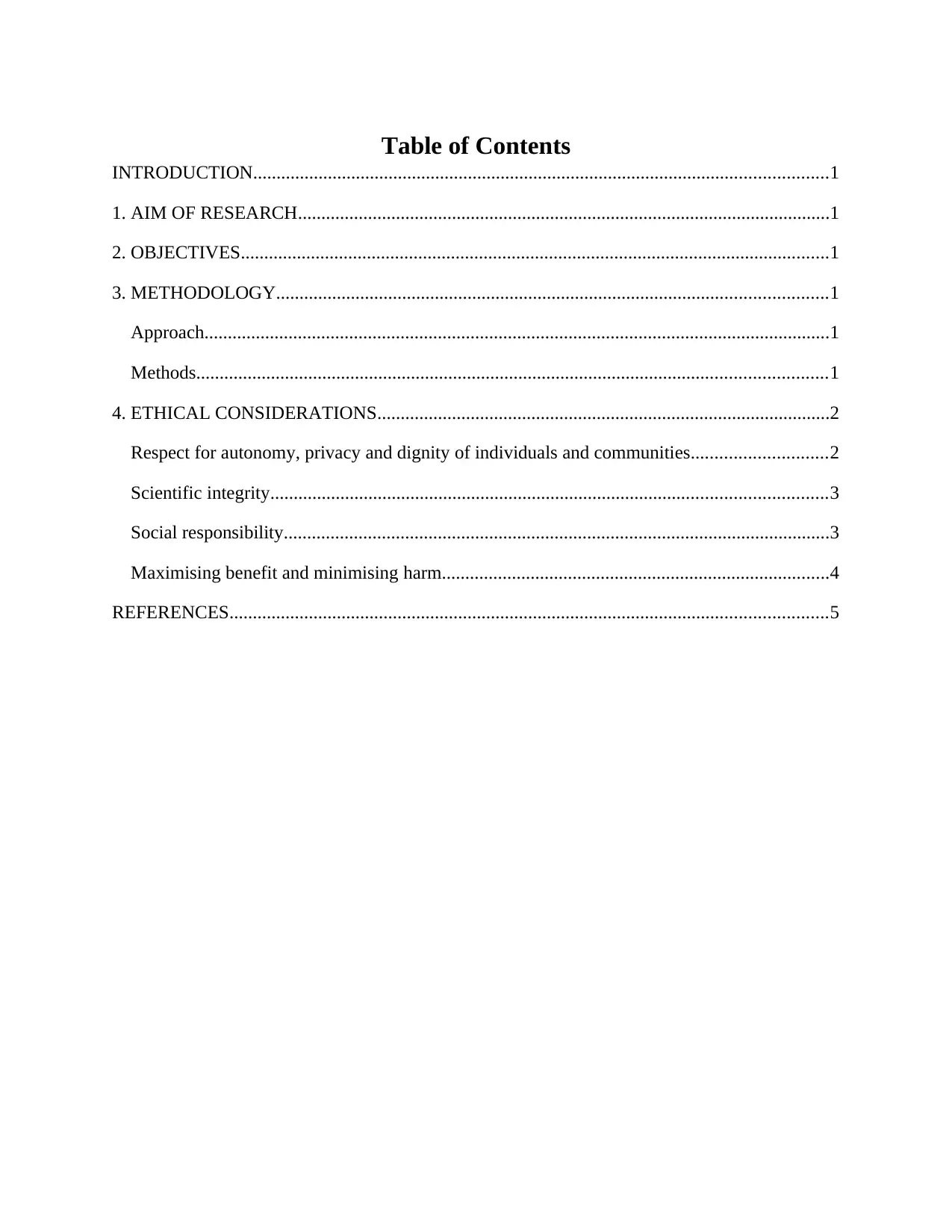
Table of Contents
INTRODUCTION...........................................................................................................................1
1. AIM OF RESEARCH..................................................................................................................1
2. OBJECTIVES..............................................................................................................................1
3. METHODOLOGY......................................................................................................................1
Approach......................................................................................................................................1
Methods.......................................................................................................................................1
4. ETHICAL CONSIDERATIONS.................................................................................................2
Respect for autonomy, privacy and dignity of individuals and communities.............................2
Scientific integrity.......................................................................................................................3
Social responsibility.....................................................................................................................3
Maximising benefit and minimising harm...................................................................................4
REFERENCES................................................................................................................................5
INTRODUCTION...........................................................................................................................1
1. AIM OF RESEARCH..................................................................................................................1
2. OBJECTIVES..............................................................................................................................1
3. METHODOLOGY......................................................................................................................1
Approach......................................................................................................................................1
Methods.......................................................................................................................................1
4. ETHICAL CONSIDERATIONS.................................................................................................2
Respect for autonomy, privacy and dignity of individuals and communities.............................2
Scientific integrity.......................................................................................................................3
Social responsibility.....................................................................................................................3
Maximising benefit and minimising harm...................................................................................4
REFERENCES................................................................................................................................5
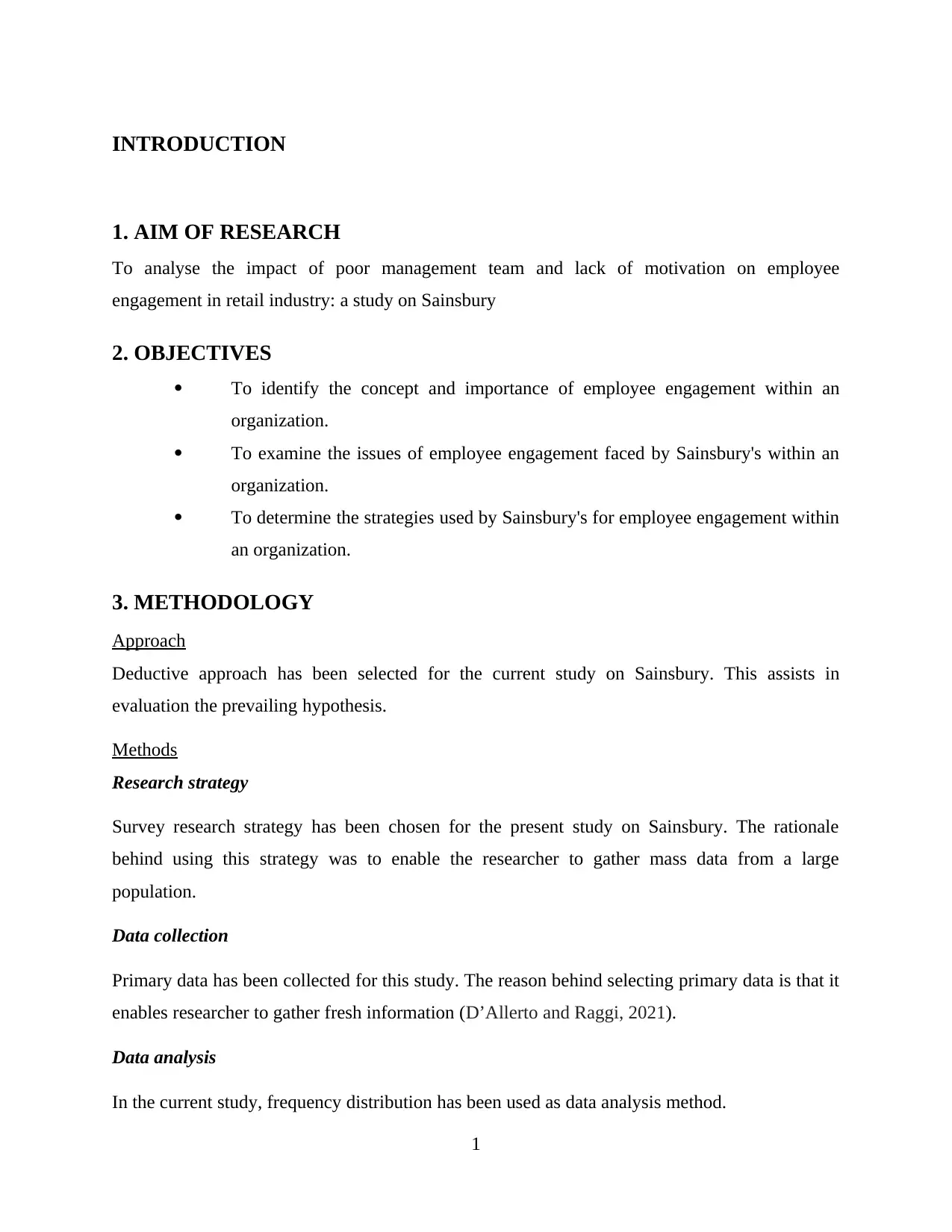
INTRODUCTION
1. AIM OF RESEARCH
To analyse the impact of poor management team and lack of motivation on employee
engagement in retail industry: a study on Sainsbury
2. OBJECTIVES
To identify the concept and importance of employee engagement within an
organization.
To examine the issues of employee engagement faced by Sainsbury's within an
organization.
To determine the strategies used by Sainsbury's for employee engagement within
an organization.
3. METHODOLOGY
Approach
Deductive approach has been selected for the current study on Sainsbury. This assists in
evaluation the prevailing hypothesis.
Methods
Research strategy
Survey research strategy has been chosen for the present study on Sainsbury. The rationale
behind using this strategy was to enable the researcher to gather mass data from a large
population.
Data collection
Primary data has been collected for this study. The reason behind selecting primary data is that it
enables researcher to gather fresh information (D’Allerto and Raggi, 2021).
Data analysis
In the current study, frequency distribution has been used as data analysis method.
1
1. AIM OF RESEARCH
To analyse the impact of poor management team and lack of motivation on employee
engagement in retail industry: a study on Sainsbury
2. OBJECTIVES
To identify the concept and importance of employee engagement within an
organization.
To examine the issues of employee engagement faced by Sainsbury's within an
organization.
To determine the strategies used by Sainsbury's for employee engagement within
an organization.
3. METHODOLOGY
Approach
Deductive approach has been selected for the current study on Sainsbury. This assists in
evaluation the prevailing hypothesis.
Methods
Research strategy
Survey research strategy has been chosen for the present study on Sainsbury. The rationale
behind using this strategy was to enable the researcher to gather mass data from a large
population.
Data collection
Primary data has been collected for this study. The reason behind selecting primary data is that it
enables researcher to gather fresh information (D’Allerto and Raggi, 2021).
Data analysis
In the current study, frequency distribution has been used as data analysis method.
1
⊘ This is a preview!⊘
Do you want full access?
Subscribe today to unlock all pages.

Trusted by 1+ million students worldwide
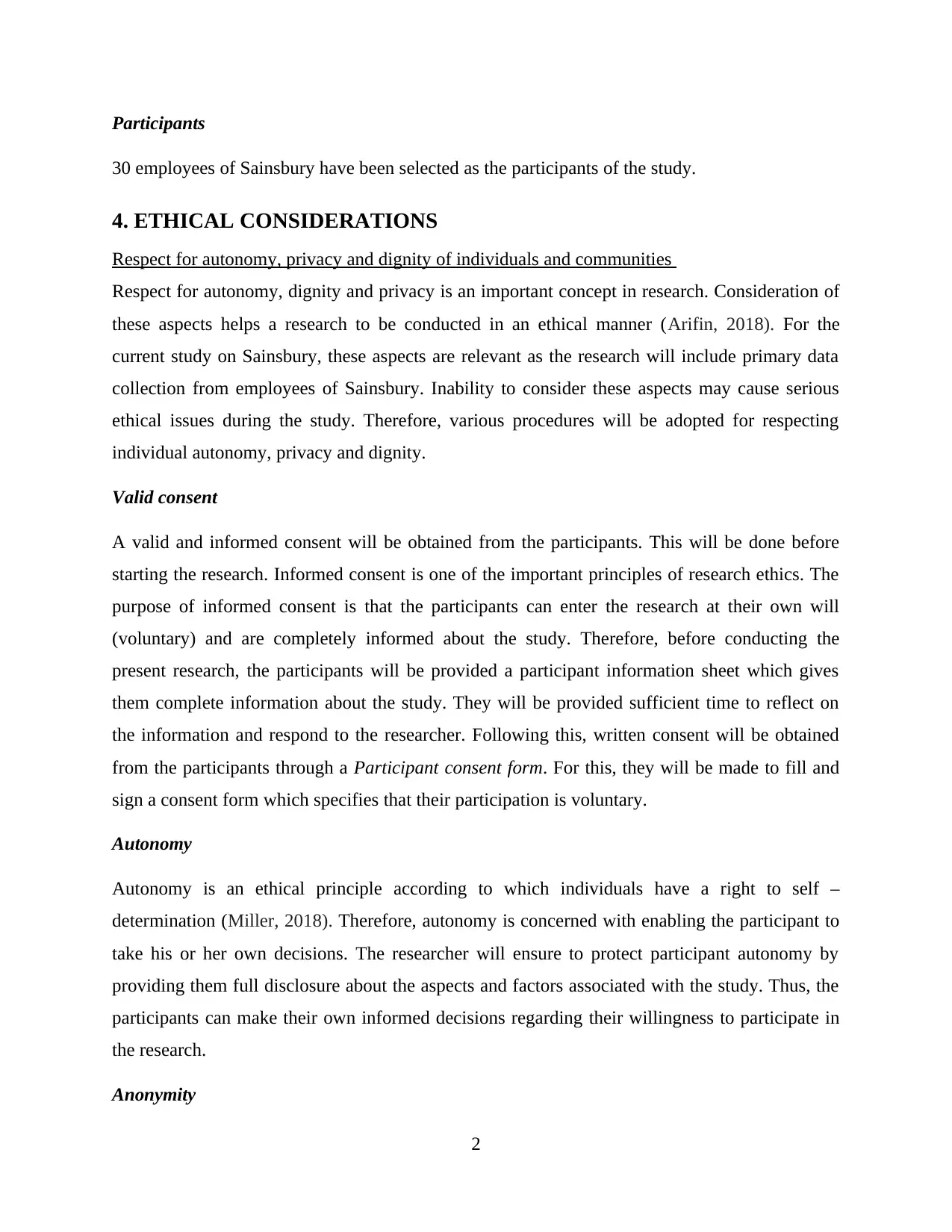
Participants
30 employees of Sainsbury have been selected as the participants of the study.
4. ETHICAL CONSIDERATIONS
Respect for autonomy, privacy and dignity of individuals and communities
Respect for autonomy, dignity and privacy is an important concept in research. Consideration of
these aspects helps a research to be conducted in an ethical manner (Arifin, 2018). For the
current study on Sainsbury, these aspects are relevant as the research will include primary data
collection from employees of Sainsbury. Inability to consider these aspects may cause serious
ethical issues during the study. Therefore, various procedures will be adopted for respecting
individual autonomy, privacy and dignity.
Valid consent
A valid and informed consent will be obtained from the participants. This will be done before
starting the research. Informed consent is one of the important principles of research ethics. The
purpose of informed consent is that the participants can enter the research at their own will
(voluntary) and are completely informed about the study. Therefore, before conducting the
present research, the participants will be provided a participant information sheet which gives
them complete information about the study. They will be provided sufficient time to reflect on
the information and respond to the researcher. Following this, written consent will be obtained
from the participants through a Participant consent form. For this, they will be made to fill and
sign a consent form which specifies that their participation is voluntary.
Autonomy
Autonomy is an ethical principle according to which individuals have a right to self –
determination (Miller, 2018). Therefore, autonomy is concerned with enabling the participant to
take his or her own decisions. The researcher will ensure to protect participant autonomy by
providing them full disclosure about the aspects and factors associated with the study. Thus, the
participants can make their own informed decisions regarding their willingness to participate in
the research.
Anonymity
2
30 employees of Sainsbury have been selected as the participants of the study.
4. ETHICAL CONSIDERATIONS
Respect for autonomy, privacy and dignity of individuals and communities
Respect for autonomy, dignity and privacy is an important concept in research. Consideration of
these aspects helps a research to be conducted in an ethical manner (Arifin, 2018). For the
current study on Sainsbury, these aspects are relevant as the research will include primary data
collection from employees of Sainsbury. Inability to consider these aspects may cause serious
ethical issues during the study. Therefore, various procedures will be adopted for respecting
individual autonomy, privacy and dignity.
Valid consent
A valid and informed consent will be obtained from the participants. This will be done before
starting the research. Informed consent is one of the important principles of research ethics. The
purpose of informed consent is that the participants can enter the research at their own will
(voluntary) and are completely informed about the study. Therefore, before conducting the
present research, the participants will be provided a participant information sheet which gives
them complete information about the study. They will be provided sufficient time to reflect on
the information and respond to the researcher. Following this, written consent will be obtained
from the participants through a Participant consent form. For this, they will be made to fill and
sign a consent form which specifies that their participation is voluntary.
Autonomy
Autonomy is an ethical principle according to which individuals have a right to self –
determination (Miller, 2018). Therefore, autonomy is concerned with enabling the participant to
take his or her own decisions. The researcher will ensure to protect participant autonomy by
providing them full disclosure about the aspects and factors associated with the study. Thus, the
participants can make their own informed decisions regarding their willingness to participate in
the research.
Anonymity
2
Paraphrase This Document
Need a fresh take? Get an instant paraphrase of this document with our AI Paraphraser
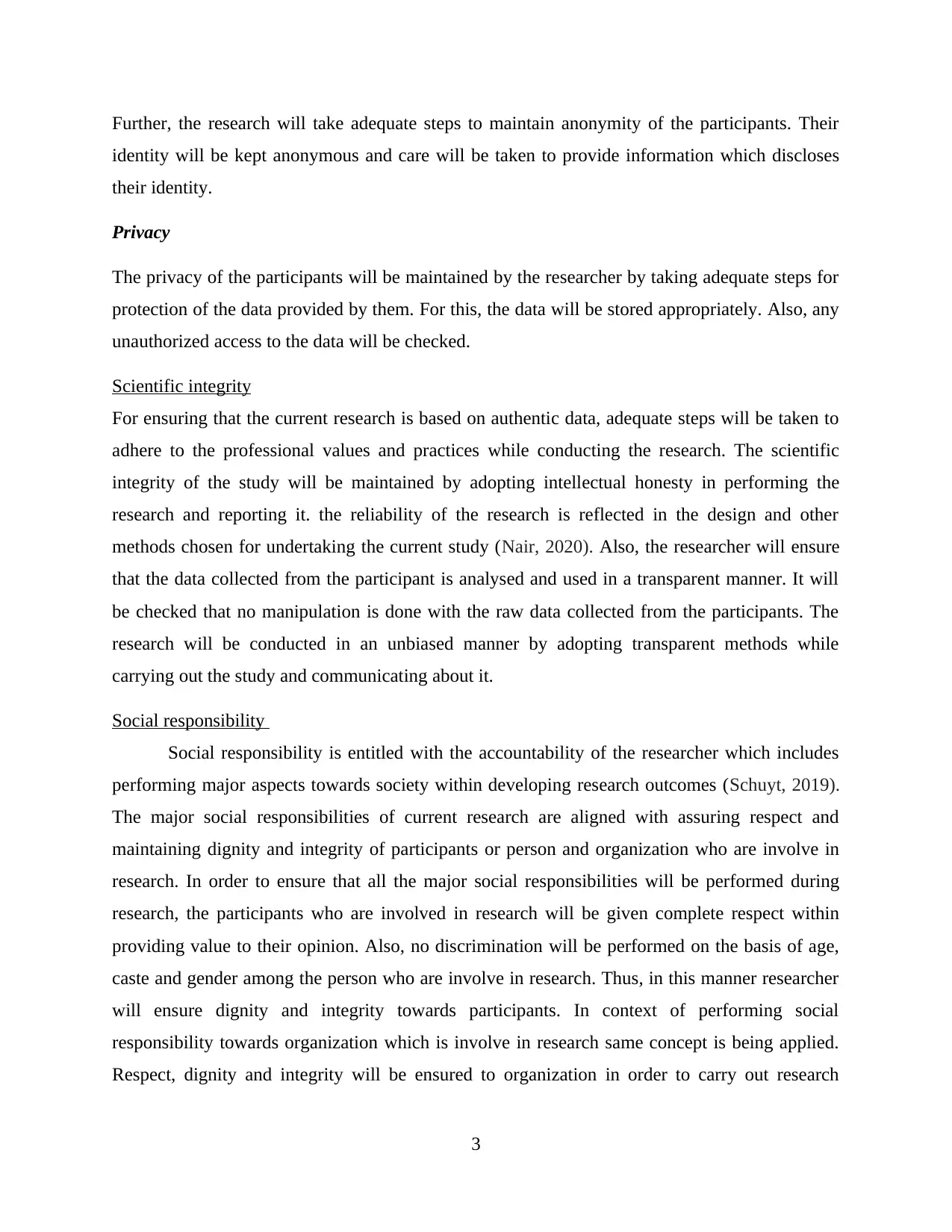
Further, the research will take adequate steps to maintain anonymity of the participants. Their
identity will be kept anonymous and care will be taken to provide information which discloses
their identity.
Privacy
The privacy of the participants will be maintained by the researcher by taking adequate steps for
protection of the data provided by them. For this, the data will be stored appropriately. Also, any
unauthorized access to the data will be checked.
Scientific integrity
For ensuring that the current research is based on authentic data, adequate steps will be taken to
adhere to the professional values and practices while conducting the research. The scientific
integrity of the study will be maintained by adopting intellectual honesty in performing the
research and reporting it. the reliability of the research is reflected in the design and other
methods chosen for undertaking the current study (Nair, 2020). Also, the researcher will ensure
that the data collected from the participant is analysed and used in a transparent manner. It will
be checked that no manipulation is done with the raw data collected from the participants. The
research will be conducted in an unbiased manner by adopting transparent methods while
carrying out the study and communicating about it.
Social responsibility
Social responsibility is entitled with the accountability of the researcher which includes
performing major aspects towards society within developing research outcomes (Schuyt, 2019).
The major social responsibilities of current research are aligned with assuring respect and
maintaining dignity and integrity of participants or person and organization who are involve in
research. In order to ensure that all the major social responsibilities will be performed during
research, the participants who are involved in research will be given complete respect within
providing value to their opinion. Also, no discrimination will be performed on the basis of age,
caste and gender among the person who are involve in research. Thus, in this manner researcher
will ensure dignity and integrity towards participants. In context of performing social
responsibility towards organization which is involve in research same concept is being applied.
Respect, dignity and integrity will be ensured to organization in order to carry out research
3
identity will be kept anonymous and care will be taken to provide information which discloses
their identity.
Privacy
The privacy of the participants will be maintained by the researcher by taking adequate steps for
protection of the data provided by them. For this, the data will be stored appropriately. Also, any
unauthorized access to the data will be checked.
Scientific integrity
For ensuring that the current research is based on authentic data, adequate steps will be taken to
adhere to the professional values and practices while conducting the research. The scientific
integrity of the study will be maintained by adopting intellectual honesty in performing the
research and reporting it. the reliability of the research is reflected in the design and other
methods chosen for undertaking the current study (Nair, 2020). Also, the researcher will ensure
that the data collected from the participant is analysed and used in a transparent manner. It will
be checked that no manipulation is done with the raw data collected from the participants. The
research will be conducted in an unbiased manner by adopting transparent methods while
carrying out the study and communicating about it.
Social responsibility
Social responsibility is entitled with the accountability of the researcher which includes
performing major aspects towards society within developing research outcomes (Schuyt, 2019).
The major social responsibilities of current research are aligned with assuring respect and
maintaining dignity and integrity of participants or person and organization who are involve in
research. In order to ensure that all the major social responsibilities will be performed during
research, the participants who are involved in research will be given complete respect within
providing value to their opinion. Also, no discrimination will be performed on the basis of age,
caste and gender among the person who are involve in research. Thus, in this manner researcher
will ensure dignity and integrity towards participants. In context of performing social
responsibility towards organization which is involve in research same concept is being applied.
Respect, dignity and integrity will be ensured to organization in order to carry out research
3
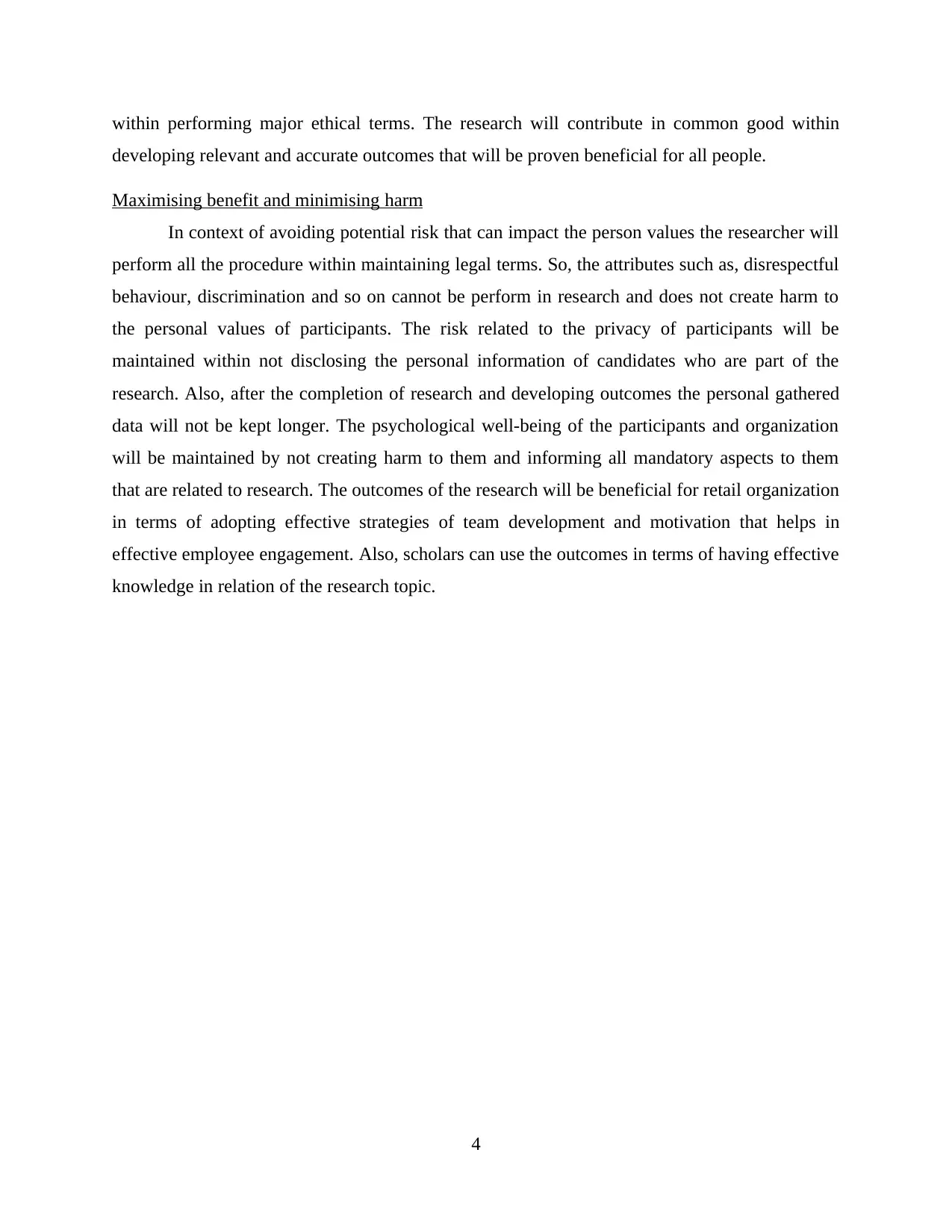
within performing major ethical terms. The research will contribute in common good within
developing relevant and accurate outcomes that will be proven beneficial for all people.
Maximising benefit and minimising harm
In context of avoiding potential risk that can impact the person values the researcher will
perform all the procedure within maintaining legal terms. So, the attributes such as, disrespectful
behaviour, discrimination and so on cannot be perform in research and does not create harm to
the personal values of participants. The risk related to the privacy of participants will be
maintained within not disclosing the personal information of candidates who are part of the
research. Also, after the completion of research and developing outcomes the personal gathered
data will not be kept longer. The psychological well-being of the participants and organization
will be maintained by not creating harm to them and informing all mandatory aspects to them
that are related to research. The outcomes of the research will be beneficial for retail organization
in terms of adopting effective strategies of team development and motivation that helps in
effective employee engagement. Also, scholars can use the outcomes in terms of having effective
knowledge in relation of the research topic.
4
developing relevant and accurate outcomes that will be proven beneficial for all people.
Maximising benefit and minimising harm
In context of avoiding potential risk that can impact the person values the researcher will
perform all the procedure within maintaining legal terms. So, the attributes such as, disrespectful
behaviour, discrimination and so on cannot be perform in research and does not create harm to
the personal values of participants. The risk related to the privacy of participants will be
maintained within not disclosing the personal information of candidates who are part of the
research. Also, after the completion of research and developing outcomes the personal gathered
data will not be kept longer. The psychological well-being of the participants and organization
will be maintained by not creating harm to them and informing all mandatory aspects to them
that are related to research. The outcomes of the research will be beneficial for retail organization
in terms of adopting effective strategies of team development and motivation that helps in
effective employee engagement. Also, scholars can use the outcomes in terms of having effective
knowledge in relation of the research topic.
4
⊘ This is a preview!⊘
Do you want full access?
Subscribe today to unlock all pages.

Trusted by 1+ million students worldwide
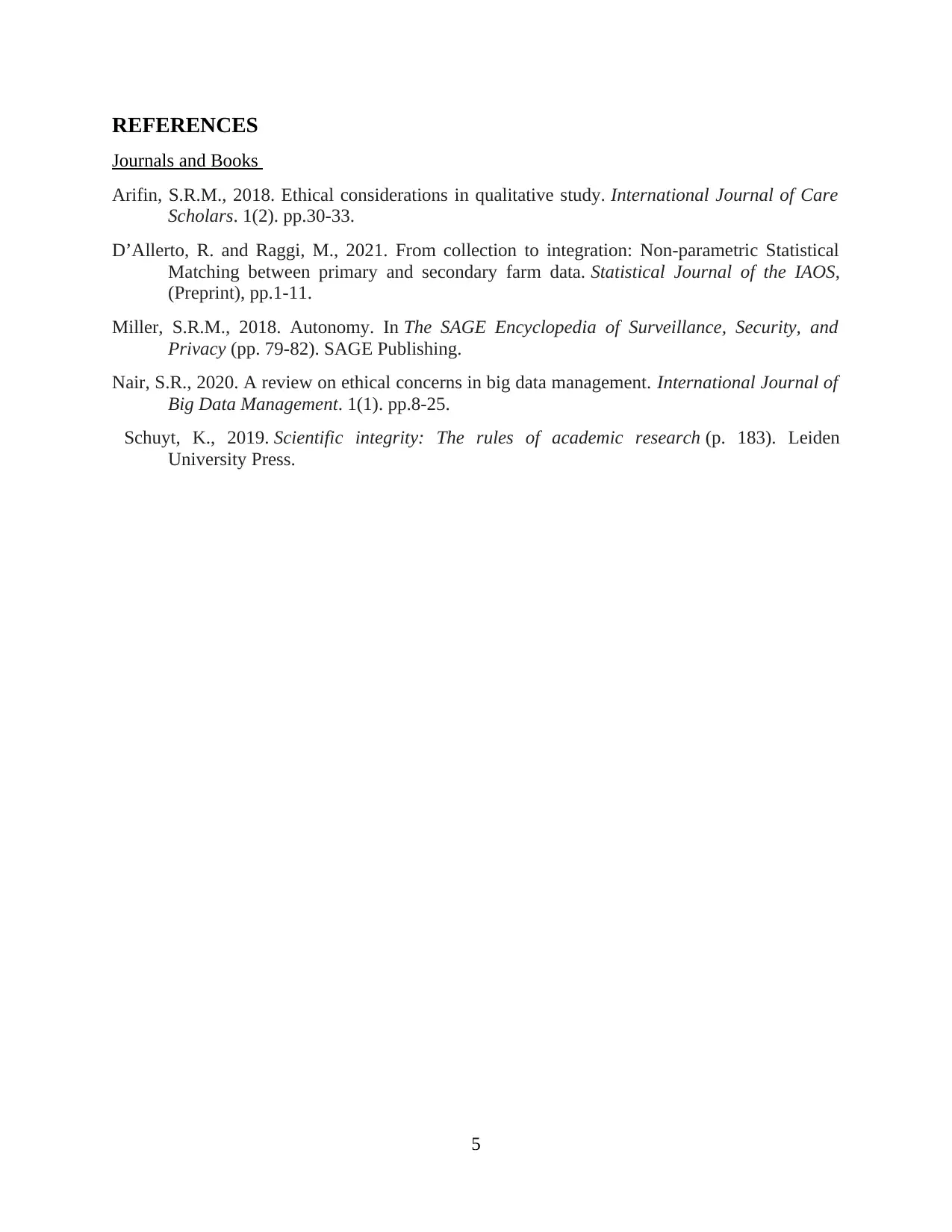
REFERENCES
Journals and Books
Arifin, S.R.M., 2018. Ethical considerations in qualitative study. International Journal of Care
Scholars. 1(2). pp.30-33.
D’Allerto, R. and Raggi, M., 2021. From collection to integration: Non-parametric Statistical
Matching between primary and secondary farm data. Statistical Journal of the IAOS,
(Preprint), pp.1-11.
Miller, S.R.M., 2018. Autonomy. In The SAGE Encyclopedia of Surveillance, Security, and
Privacy (pp. 79-82). SAGE Publishing.
Nair, S.R., 2020. A review on ethical concerns in big data management. International Journal of
Big Data Management. 1(1). pp.8-25.
Schuyt, K., 2019. Scientific integrity: The rules of academic research (p. 183). Leiden
University Press.
5
Journals and Books
Arifin, S.R.M., 2018. Ethical considerations in qualitative study. International Journal of Care
Scholars. 1(2). pp.30-33.
D’Allerto, R. and Raggi, M., 2021. From collection to integration: Non-parametric Statistical
Matching between primary and secondary farm data. Statistical Journal of the IAOS,
(Preprint), pp.1-11.
Miller, S.R.M., 2018. Autonomy. In The SAGE Encyclopedia of Surveillance, Security, and
Privacy (pp. 79-82). SAGE Publishing.
Nair, S.R., 2020. A review on ethical concerns in big data management. International Journal of
Big Data Management. 1(1). pp.8-25.
Schuyt, K., 2019. Scientific integrity: The rules of academic research (p. 183). Leiden
University Press.
5
1 out of 7
Related Documents
Your All-in-One AI-Powered Toolkit for Academic Success.
+13062052269
info@desklib.com
Available 24*7 on WhatsApp / Email
![[object Object]](/_next/static/media/star-bottom.7253800d.svg)
Unlock your academic potential
Copyright © 2020–2026 A2Z Services. All Rights Reserved. Developed and managed by ZUCOL.





